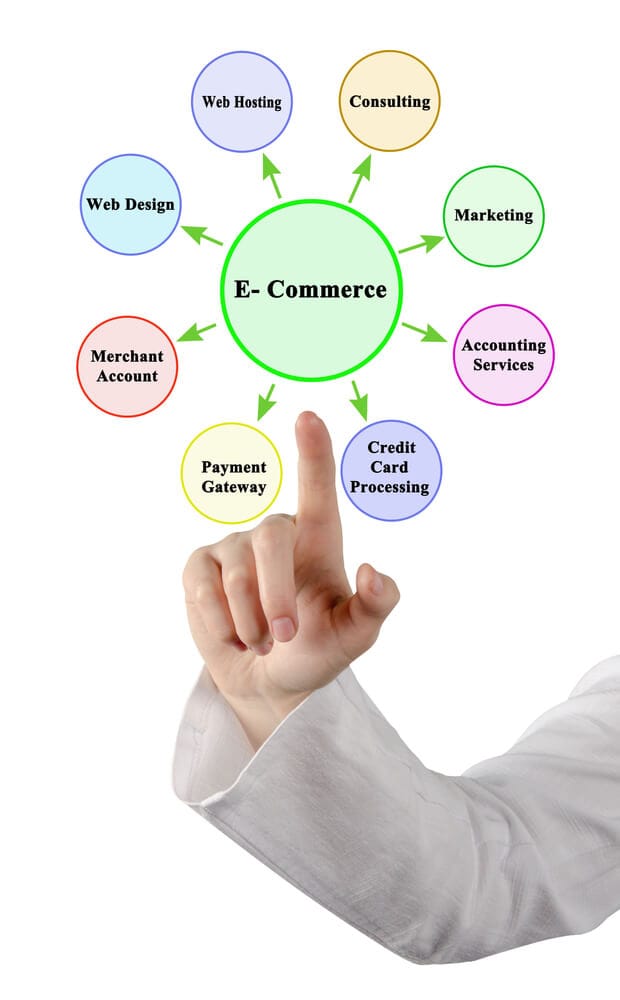- info@dwsolutions.ca
- (416) 500-1916
E-commerce Platform Integration
Seamless Integration with E-Commerce Platforms
Canada’s leading Ecommerce Agency, ready to boost your
rankings and drive exceptional results.
What Is E-Commerce Platform Integration?
E-commerce platform integration refers to the process of connecting an online store with various tools, systems, or platforms to streamline operations and enhance the shopping experience. This integration ensures that essential systems, such as inventory management, payment gateways, shipping solutions, and customer relationship management (CRM), work together seamlessly. By creating a unified ecosystem, businesses can reduce manual efforts, improve accuracy, and offer a smoother experience to customers.
A well-integrated e-commerce platform allows real-time data synchronization between connected systems. For instance, when a product is purchased, the inventory levels are automatically updated, and the order details are sent to the warehouse for processing. Payment confirmations and shipping updates can also be automated, reducing the chances of errors and improving efficiency. These integrations not only save time but also provide businesses with actionable insights through centralized reporting and analytics.
With the growing complexity of online shopping, e-commerce integration has become essential for staying competitive. By enabling a unified view of operations, businesses can focus more on growth strategies rather than day-to-day technical challenges. Additionally, it enhances customer satisfaction by ensuring timely order fulfillment, accurate stock levels, and personalized interactions based on customer data.
Benefits of Integrating Your E-Commerce Platform
Integrating your e-commerce platform offers significant benefits that streamline business operations and enhance customer satisfaction. One of the primary advantages is automation, which reduces manual tasks like updating inventory, managing orders, and tracking shipments. This not only saves time but also minimizes human errors, ensuring smoother operations and accurate data management. By automating routine tasks, businesses can focus more on strategic initiatives like marketing, customer engagement, and product development.
Another key benefit is the improved customer experience. Integration allows for real-time synchronization of information such as product availability, delivery timelines, and pricing. Customers can make informed decisions without facing issues like stockouts or incorrect pricing. Additionally, features like personalized recommendations and seamless checkout processes become more efficient with integrated platforms, fostering customer loyalty and repeat business.
E-commerce integration also provides businesses with comprehensive insights through centralized data management. By connecting systems like CRM, analytics tools, and marketing platforms, businesses can analyze customer behavior, monitor sales trends, and evaluate performance metrics more effectively.

Key Features of a Successful Integration

A successful e-commerce platform integration hinges on seamless data synchronization across all connected systems. This means that vital information, such as inventory levels, order details, customer data, and payment statuses, is updated in real-time. Real-time synchronization ensures that businesses can manage their operations more efficiently, preventing issues like overselling or miscommunication with customers. Additionally, it eliminates redundant data entry, saving time and reducing errors.
Another critical feature is compatibility with multiple platforms and third-party tools. A robust integration should work seamlessly with various systems, such as payment gateways, shipping providers, marketing platforms, and CRM software. This flexibility allows businesses to tailor their operations according to their unique needs, ensuring that all essential tools collaborate efficiently. Moreover, the ability to integrate with popular platforms ensures scalability and future-proofing as business needs evolve.
Security and compliance are equally important features in e-commerce platform integration. Integrated systems must handle sensitive data, such as payment details and customer information, securely. Compliance with standards like PCI DSS for payment processing and GDPR for data protection is crucial to maintain customer trust and avoid legal complications. Reliable integration solutions offer encryption, secure APIs, and regular updates to address vulnerabilities and ensure safe operations.
Lastly, user-friendly interfaces and ease of use contribute to a successful integration. Businesses need systems that are easy to set up, manage, and monitor without requiring extensive technical knowledge. Dashboards that provide a clear overview of operations, along with customizable settings, enable users to adapt the integration to their specific needs. Intuitive tools and responsive support from integration providers also play a significant role in ensuring smooth implementation and ongoing operations.
Steps to Implement E-Commerce Platform Integration
Implementing e-commerce platform integration begins with assessing your business needs and identifying the tools and systems you want to connect. Start by analyzing your current operations, such as inventory management, order processing, customer engagement, and marketing. Determine which platforms, like payment gateways or CRM software, will add value to your business when integrated. Creating a clear roadmap at this stage helps ensure the integration process aligns with your business goals and enhances efficiency.
Next, choose the right integration solution that fits your requirements. Many platforms offer built-in integrations, while others may require third-party tools or custom APIs. Evaluate the compatibility, scalability, and security features of the integration options available. It’s also essential to test the integration in a sandbox environment to ensure all systems communicate effectively before deploying it live. This testing phase helps identify and address potential issues, preventing disruptions during the launch.
Once the integration is live, continuously monitor its performance to ensure it functions as intended. Regularly review system logs, customer feedback, and analytics to detect and resolve any issues promptly. Keep your integrated platforms up to date with the latest software versions and security patches to maintain optimal performance. Training your team on using the integrated systems efficiently is equally important to maximize the benefits of the integration. By following these steps, businesses can ensure a smooth implementation process and long-term success.

Top Tools for E-Commerce Platform Integration
Choosing the right tools for e-commerce platform integration is critical to ensuring seamless operations and a better customer experience. One of the most popular tools is Zapier, a no-code automation platform that connects e-commerce platforms with various apps and services. With its vast library of integrations, Zapier enables businesses to automate workflows, such as syncing orders with CRM systems, updating inventory, and managing marketing campaigns. Its user-friendly interface makes it ideal for businesses of all sizes.

Another widely used tool is Shopify’s App Store, which offers a range of integration solutions specifically designed for Shopify stores. These apps allow businesses to integrate with payment gateways, shipping providers, social media platforms, and analytics tools. For WooCommerce users, plugins like WooCommerce Zapier and AutomateWoo provide similar functionalities, making it easier to connect and manage multiple systems within WordPress environments.
Enterprise-level tools like MuleSoft or Celigo are excellent choices for larger businesses with complex integration needs. These platforms provide robust features for connecting e-commerce systems with ERP (Enterprise Resource Planning), supply chain management, and advanced analytics. They also offer strong security and scalability, making them suitable for handling large volumes of data and transactions. Although these tools require more technical expertise, their comprehensive features make them a worthwhile investment for growing businesses.
Lastly, APIs (Application Programming Interfaces) offered by most e-commerce platforms provide developers with the flexibility to create custom integrations tailored to unique business requirements. Platforms like Shopify, Magento, and BigCommerce have extensive API documentation, enabling businesses to connect with virtually any third-party system. This approach is ideal for businesses that require highly specific workflows or need to integrate with niche tools. With the right combination of tools, businesses can ensure a well-integrated e-commerce ecosystem that drives efficiency and growth.
Common Challenges and How to Overcome Them
E-commerce platform integration often comes with challenges that can disrupt business operations if not addressed proactively. One of the most common issues is data synchronization errors, where information such as inventory levels, order statuses, or customer details fails to update in real-time. This can lead to problems like overselling or delayed order processing. To overcome this, businesses should implement real-time data synchronization tools and regularly monitor integration logs to identify and resolve discrepancies promptly.
Another challenge is compatibility between different systems. Not all e-commerce platforms and third-party tools are designed to work seamlessly together, leading to integration failures or limited functionality. Businesses can address this issue by choosing tools with broad compatibility and support for APIs or middleware solutions. Testing the integration in a sandbox environment before going live also helps identify potential compatibility issues and ensures smooth operation.
Scalability is another significant concern for growing businesses. As sales volume increases, the integrated systems may struggle to handle the load, leading to slow performance or downtime. To prevent this, businesses should opt for integration solutions that are designed to scale with their operations. Cloud-based platforms, for example, offer the flexibility to handle increased traffic and data volume, ensuring consistent performance during peak times.
Finally, security and compliance are critical challenges in e-commerce integration. Handling sensitive data, such as customer information and payment details, requires robust security measures to prevent breaches and ensure compliance with regulations like GDPR or PCI DSS. Businesses can mitigate risks by using integration tools with built-in encryption, secure APIs, and regular software updates. Conducting regular security audits and training employees on data protection best practices further strengthens the security of the integrated ecosystem. By addressing these challenges proactively, businesses can ensure a smooth and secure integration process.

